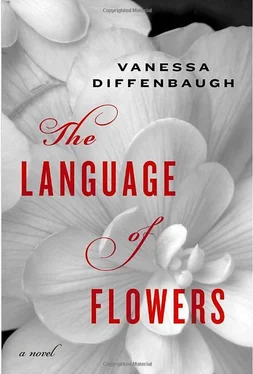“Good,” she said again, when I had answered an uninterrupted stream of questions. “Very good. You learn quickly.” She pulled back my chair, and I slid down. “Now go sit in the garden while I cook dinner. Spend time in front of every plant you know, and ask yourself the same questions I asked you. How many petals, what color, what shape. If you know it’s a rose, what makes it a rose and not a sunflower?”
Elizabeth was still rattling off questions as I skipped toward the kitchen door.
“Pick out something for Catherine!” she called.
I disappeared down the steps.
Renata looked surprisedto see me sitting on the curb at seven a.m. when she parked her truck on the empty street. I had been up all night, and looked it. She raised her eyebrows and smiled.
“Stay up waiting for Santa?” she asked. “Didn’t anyone ever tell you the truth?”
“No,” I said. “No one ever did.”
I followed Renata into the walk-in and helped her pull out the buckets of red roses, white carnations, and baby’s breath. They were my least favorite flowers. “Please tell me this was at the request of a dangerous bride.”
“She threatened me with my life,” she said. We shared a disdain for red roses.
Renata left, and when she came back with two cups of coffee, I had already finished three centerpieces.
“Thanks,” I said, reaching for the paper cup.
“You’re welcome. And slow down. The faster we finish, the more time I’ll have to spend at my mother’s Christmas party.”
I picked up a rose and cut off the thorns in slow motion, lining up the sharp spikes on the table.
“Better,” she said, “but not quite slow enough.”
We worked with exaggerated sluggishness for the rest of the morning, but we were still finished by noon. Renata picked up the order and checked and double-checked our arrangements. She set down the list.
“That’s it?”
“Yes,” she said, “unfortunately. Just the delivery and then the Christmas party—you’re coming with me.”
“No thanks,” I said, taking a final sip of cold coffee and putting on my backpack.
“Did that sound optional to you? It’s not.”
I could have fought her on it, but I was feeling indebted for the bonus, and I was in the mood for holiday food if not holiday cheer. I didn’t know anything about Russian food, but it had to be better than the processed ham I had planned on eating right out of the package.
“Whatever,” I said. “But I have somewhere to be by five.”
Renata laughed. She must have known it was inconceivable that I had anywhere to be on Christmas.
Renata’s mother lived in the Richmond District, and we took the longest route possible across the city.
“My mother’s too much,” Renata said.
“In what way?” I asked.
“In every way,” she said.
We pulled up in front of a bright pink house. A Christmas flag flew on a wooden pole, and the small porch was crowded with glowing plastic creatures: angels, reindeer, chipmunks in Santa hats, and dancing penguins with knit scarves.
Renata pushed the door open, and we walked into a wall of heat. Men and women sat on the cushions, arms, and back of a single couch; school-age boys and girls lay on their stomachs on the shag carpet, toddlers crawling over their skinny legs. I stepped in and took off my jacket and sweater, but the path to the coat closet, where Renata greeted someone about my age, was completely blocked by small body parts.
As I stood by the door, an older, softer version of Renata pushed her way through the crowd. She carried a large wooden tray with sliced oranges, nuts, figs, and dates.
“Victoria!” she exclaimed when she saw me. She handed the tray to Natalya, who was lounged on the couch, and climbed over the children blocking her way to where I stood. When she hugged me, my face pressed into her armpit and the flared sleeves of her gray wool sweater wrapped around my back like living things. She was a tall woman, and strong—and when I finally wriggled away, she grasped my shoulders and tilted my face up to look at her. “Sweet Victoria,” she said, her long, wavy white hair spilling forward and tickling my cheeks. “My daughters have told me so much about you—I loved you even before I met you.”
She smelled of primrose and apple cider. I peeled myself away. “Thank you for inviting me to your party, Mrs.—” I stopped, realizing Renata had never told me her name.
“Marta Rubina,” she said. “But I only answer to Mother Ruby.” She reached forward as if to shake hands, then laughed and hugged me again. We were wedged into the corner, and only the thick plaster walls behind my back kept me standing. She pulled me forward, her arm around my shoulders, and led me around the room. The children scattered out of the way, and Renata, perched on a folding chair in the corner, watched with an amused smile.
Mother Ruby guided me into the kitchen, where she sat me at a table with two heaping plates of food. The first held a large baked fish, whole, with spices and some kind of root vegetables. The second held beans, peas, and potatoes with parsley. She handed me a fork and a spoon, and a bowl of mushroom soup. “We ate hours ago,” she said, “but I saved you food. Renata told me you’d be hungry—which pleased me greatly. I love nothing more than feeding family.”
Mother Ruby sat down across from me. She boned my fish, poked her finger in my peas, and reheated them after exclaiming over the temperature. She introduced me to everyone who walked by: daughters, sons-in-law, grandchildren, boyfriends and girlfriends of various family members.
I looked up and nodded but did not put down my fork.* * *
I fell asleep at Mother Ruby’s. I hadn’t meant to. After dinner, I escaped into an empty guest room, and between the heavy food and the previous night’s insomnia, I was unconscious almost before I lay down.
The smell of coffee pulled me out of bed the next morning. Stretching, I wandered down the hall until I found the bathroom. The door was open. Inside, Mother Ruby was in the shower behind a clear plastic curtain. When I saw her, I spun around and ran back down the hall.
“Come in!” she called after me. “There’s only one bathroom. Don’t pay any attention to me!”
I found Renata in the kitchen, pouring coffee. She handed me a mug.
“Your mother’s in the shower,” I said.
“With the door open, I’m sure,” she said, yawning.
I nodded.
“Sorry about that.”
I poured a cup of coffee and leaned against the kitchen sink.
“My mother was a midwife in Russia,” Renata said. “So she’s used to seeing women naked just moments after meeting them. America in the seventies worked for her just fine, and I don’t think she’s noticed that times have changed.”
Mother Ruby came into the kitchen then, tied up in a bright coral terry-cloth robe. “What’s changed?” she asked.
Renata shook her head. “Nudity.”
“I don’t think nudity’s changed since the birth of the first human,” Mother Ruby said. “Only society has changed.”
Renata rolled her eyes and turned to me. “My mother and I have been having this argument since I was old enough to talk. When I was ten, I told her I wouldn’t have kids because I never wanted to be naked in front of her again. And look at me—fifty and childless.”
Mother Ruby broke an egg into a pan, and it crackled. “I delivered all twelve of my grandchildren,” she told me with pride.
“You’re still a midwife?”
“Not legally,” she said. “But I still get two a.m. calls from all over this city. And I go every time.” She handed me a plate of eggs over easy.
Читать дальше












